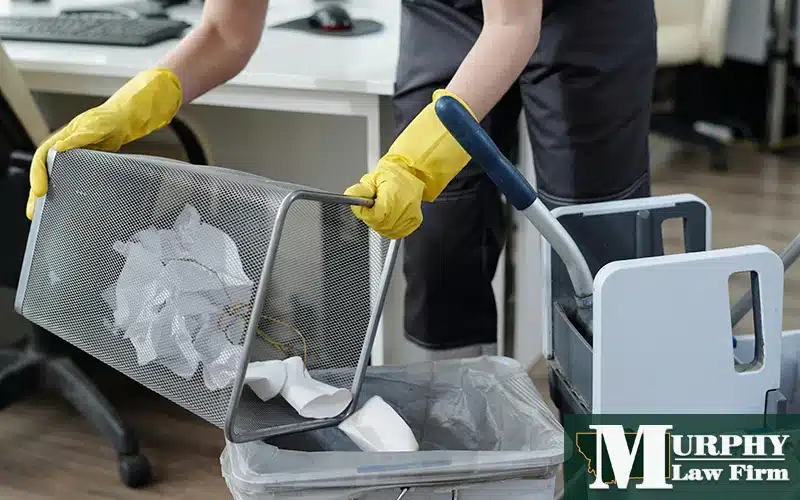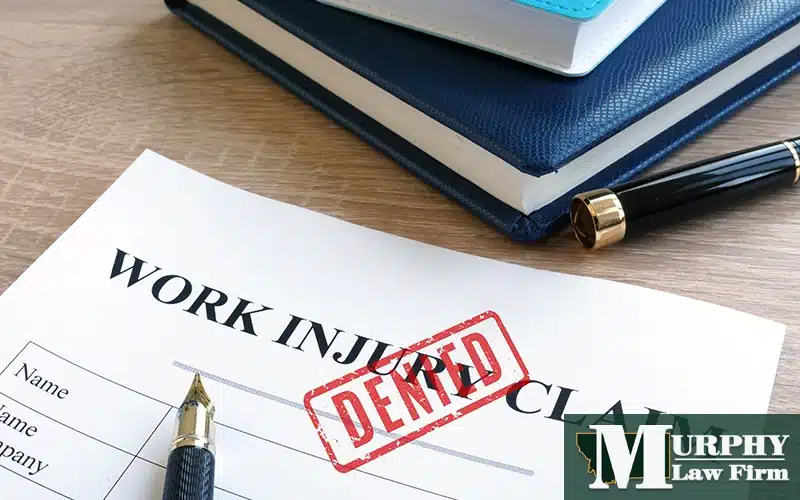
Learn how to file a claim and maximize your benefits after an injury as a janitor, housekeeper, or custodian in Great Falls
From busy offices kept spotless by Big Sky Cleaning Services in Billings to sparkling homes maintained by Maid To Clean MT in Belgrade, Montana’s residential and commercial cleaners work behind the scenes to keep our workplaces and homes spotless.
Unfortunately, despite their contributions, injuries are a common concern for cleaners. These workers face numerous risks on the job that can lead to serious and sometimes life-altering injuries.
The physical toll of an injury is just the beginning; the financial implications can be equally devastating. When injured on the job, workers are thrust into a challenging situation where, even with Montana workers’ compensation benefits, their families’ financial security can be jeopardized, especially if they’re the primary breadwinners.
For those suffering from serious work injuries, the harsh reality is that life may never return to what it was before. The recovery journey can be long and fraught with uncertainty, and for some, returning to their previous state of health or employment is impossible.
This stark truth underscores the vulnerability of workers in the face of life-changing injuries. The battle for fair compensation and support becomes even more daunting when it involves standing up against large corporations. For the “little guy,” this fight can feel overwhelming, almost hopeless.
At Murphy Law Firm, we understand these challenges deeply. We’ve stood by many individuals facing this uphill battle, witnessing firsthand the impact on their lives and their families.
Our commitment is to stand with you, offering our expertise and support to navigate these complex situations.
We’re here not just to fight for your rights but to ensure that you and your family find a path forward with the dignity and security you deserve.
Injured at work?
Are you struggling with your Montana workers’ comp claim?
Our attorneys can help.
Job-related risks for janitors in Great Falls and other Montana communities
Janitors encounter various hazards that can lead to serious injuries. These risks include:
- Slips, trips, and falls. Wet floors, uneven surfaces, or obstacles in walkways are common in cleaning environments.
- Exposure to chemicals. Prolonged chemical exposure can cause various short- and long-term health issues, highlighting the need for proper ventilation and protective gear.
- Repetitive motion injuries. Tasks like mopping, vacuuming, and wiping down surfaces can lead to strains and sprains.
- Heavy lifting. Moving furniture and operating heavy equipment can cause muscle strain, hernias, and other overexertion injuries.
- Cuts and lacerations. Using sharp tools or handling broken objects can lead to cuts.
Common bodily injuries for cleaners and custodian workers
The job-related risks faced by janitors can lead to a variety of injuries, from the immediate to the chronic. These injuries encompass:
- Musculoskeletal injuries, such as back injuries and shoulder strains, often result from heavy lifting or repetitive motion tasks.
- Respiratory conditions arising from prolonged exposure to cleaning chemicals can include asthma, chronic obstructive pulmonary disease (COPD), and other respiratory illnesses.
- Skin conditions and severe burn injuries often result from direct contact with harsh cleaning agents, underscoring the importance of using protective gloves and following safety protocols.
- Concussions and other injuries from falls, like spinal cord injuries and fractures, emphasize the significance of maintaining clean, dry, and obstacle-free floors.
- Cuts and infections can happen from handling hazardous waste or sharp objects, which can be mitigated through careful handling and the use of protective equipment.
In addition to these physical injuries, janitors are also at risk for various occupational illnesses, which are health conditions that develop over time due to continuous exposure to workplace hazards.
Occupational illnesses from long-term exposure to certain cleaning agents can lead to hearing loss, skin diseases such as dermatitis, and even more severe conditions like cancer.
Understanding both the immediate and prolonged health risks associated with janitorial work is crucial for ensuring workplace safety and health.
Are janitorial or custodial workers in Montana eligible for workers’ compensation?
Yes, in Montana, most employers with even 1 full- or part-time employee are required to carry workers’ compensation insurance. This insurance covers employees in case of a work-related injury, illness, or disease.
To be eligible for these benefits, you’ll need to show that your injury, illness, or disease directly resulted from your job duties.
For example, if you slip and fall on a wet floor while mopping and injure your back, this would likely be covered under workers’ compensation because it happened while performing your cleaning tasks.
It’s important to note that workers’ compensation is a form of no-fault insurance, so workers are generally entitled to benefits even if the accident that caused the injury was their fault.
Another key point: Although workers’ compensation covers work-related injuries and illnesses, it likely won’t cover a health condition like a heart attack caused by high blood pressure or high cholesterol that could have happened anywhere. This is because the primary cause wouldn’t be directly connected to your job activities but to your personal health and lifestyle.
Types of workers’ comp benefits you can get
The specific benefits you’re entitled to depend on the details of your injury and required treatment. Here’s a general breakdown of what Montana workers’ compensation typically offers:
- Medical benefits. This covers all necessary medical expenses related to your cleaning-related injury, including past and future costs like doctor visits, medications, and physical therapy.
- Wage loss benefits. If your injury prevents you from working, you may be eligible for two-thirds of your average weekly wage while you recover. This helps replace lost income and ease financial stress during your healing process.
- Death benefits. In the tragic event of a work-related death due to an injury or illness, these benefits can help cover funeral costs and offer some financial support to eligible dependents who rely on the deceased’s income.
Immediate steps to take when injured on the job in Montana
If you’ve been injured while performing your duties as a janitor, it’s important to take certain steps to ensure you receive proper care and support. Here’s a clear and straightforward guide to help you navigate the workers’ comp process in Montana:
- Report the injury immediately. Inform your supervisor or employer about your injury as soon as possible. This creates a record of the incident and allows them to assist you. To qualify for workers’ comp benefits, you must verbally report your injury to your employer within 30 days and provide a written report within 1 year, but the sooner you do this, the better your chances of a successful claim.
- Seek medical attention. Don’t hesitate to seek the medical attention you need. This not only prevents your injury from getting worse but also directly ties it to your job, which is crucial if you want to receive workers’ comp benefits. Get checked out by a doctor, or visit the emergency room if necessary. Also, make sure the health care professional documents your injury and how it occurred.
- Document the incident. While your memory is fresh, take detailed notes on how the injury happened. Include specifics like the location, the task you were performing, and any witnesses who may have observed the incident. If possible, gather statements from those witnesses.
- File a workers’ compensation claim. Filing a workers’ compensation claim allows you to receive benefits that can help cover medical bills and potentially replace a portion of your lost wages while you recover. Your employer is required to file a First Report of Injury (FROI) form within 6 days of being notified of your injury, and they must file a workers’ comp claim with their insurer within 1 year. You should follow up with your employer to ensure these steps have been followed.
Remember: Your health and well-being are the top priorities. Taking these steps can help you get the care you deserve and ensure a smoother recovery process.
Visit our comprehensive guide on filing a Montana workers’ compensation claim to equip yourself with the knowledge necessary to handle your claim efficiently and effectively.
We offer in-depth insights on how to file your claim, important timelines you need to be aware of, where exactly to file, and whom to contact for assistance throughout the process.
Common problems injured workers face
Injured janitors might encounter several obstacles when seeking workers’ comp benefits, including:
- Claims denials. Disputes over the work-related nature of the injury or insufficient documentation. This often happens with occupational diseases or illnesses like hearing loss or carpal tunnel syndrome that occur over time and are more complicated to directly tie to your job.
If your claim is denied, don’t give up. Montana law allows you up to 2 years to appeal the decision. Reach out to a local work injury attorney to avoid jeopardizing your chance of receiving the benefits you deserve. - Underestimation of injuries. Employers or insurers may downplay the severity of injuries to minimize benefits.
- Delayed benefits. If your claim is taking a long time to process, talk to your employer or a workers’ compensation representative to inquire about the status.
- Employer retaliation. In worst-case scenarios, injured workers might face job loss or discrimination for filing a claim.
Steps in appealing denied claims
Here’s what you can do to protect your right to compensation when insurance denies your claim…
Don’t face your injury alone. Get legal support.
Being injured on the job is stressful. Our Montana injury attorney can be a valuable asset in securing the benefits you deserve. Here’s how:
- Ensuring a smooth claim process. We’ll ensure your claim is filed correctly and within Montana’s legal deadlines, maximizing your chances of approval.
- Advocating for your rights. If your claim is denied or disputed, we’ll fight for your rights and ensure your voice is heard throughout the process.
- Securing proper medical care. We’ll help you obtain the necessary medical treatment and evaluations to document your injury and support your claim.
- Negotiating fair compensation. We’ll negotiate for fair compensation and benefits, including coverage for past and future medical expenses and lost wages you’re entitled to receive.
- Expert guidance and representation. Throughout the process, we’ll provide expert guidance, represent you in disputes or appeals, and protect you from potential employer retaliation.
Our goal is to help you recover from your injury with peace of mind, knowing you have a qualified professional by your side.
Contact us today. Complete our form or give us a call to schedule a free consultation.




